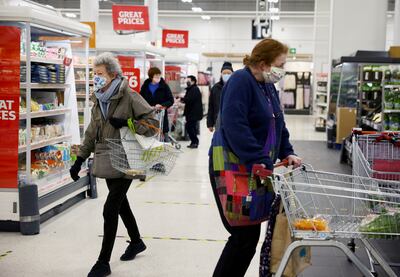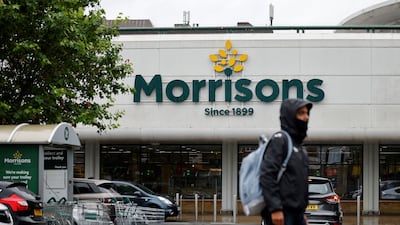British supermarket Sainsbury’s beat expectations for its first-quarter sales on Tuesday, while online grocer Ocado said its half-year retail sales had jumped 20 per cent.
No wonder then that bullish growth for Britain’s supermarkets is attracting the interest of buy-out bidders for Sainsbury’s smaller rival, Morrisons.
Three private equity bidders have thrown their hat in the ring for the supermarket group, just months after Asda was snapped up in a £6.8 billion ($9.4bn) buy-out by the Issa brothers and London private equity firm TDR Capital, who took on £3.5bn of debt to fund the acquisition from Walmart.
"There’s a lot of interest in the sector," Simon Roberts, Sainsbury’s chief executive officer, said on Tuesday.
With interest also zoning in on Sainsbury’s, the UK grocery sector is set for a huge shake-up. But it’s not all plain-sailing, with concerns about assets being sold off too cheaply, and the industry facing a number of major challenges from staff shortages to global food price pressures and Covid supply chain disruption.
Those worried about supply chain disruption and staffing issues might be wondering if the Morrisons negotiations might involve more than cold hard cash, said Dani Hewson, an analyst at AJ Bell.
“Could the courtship push other issues to the fore?” she said.
“Could negotiations include promises about supplier terms, staff and assets in the same way pension promises are already upping the ante.”
Such is the furore surrounding Britain’s supermarkets that Sainsbury's raised its profit forecast on Tuesday and said it now expects to generate profit of £660 million this fiscal year, up from a previous forecast of £620m and far exceeding pre-Covid levels.
The group, which trails market leader Tesco in annual sales, said like-for-like sales, excluding fuel, rose 1.6 per cent in the 16 weeks to June 26, its fiscal first quarter – versus analysts' average forecast of a fall of 1.7 per cent and a rise of 11.3 per cent in the previous quarter.
Sainsbury's said sales of grocery, general merchandise and clothing were all higher than its expectations throughout the quarter, helping the chain to outperform competitors and grow its market share.
This is all despite Britain gradually easing its Covid-restrictions with cafes and restaurants now fully open for indoor and outdoor dining and the government planning to ease all curbs on July 19.
“Sainsbury’s faced an extremely hard act to follow in the past three months compared with a year ago when many people were panic buying in the early stages of the pandemic,” said AJ Bell investment director Russ Mould.
“This makes it all the more impressive that the company has managed to chalk up growth for the period and confirms the attractions of a UK groceries space, which was recently reflected in the multibillion-pound bid for Morrisons.”
Meanwhile, Ocado said demand for its grocery business and technology were strong after it announced a significant boost in first-half retail revenue on Tuesday as well as a new contract in Spain.
The online grocer said the pandemic had resulted in a permanent shift to web-based shopping, helping drive demand for groceries it sells with partner Marks & Spencer and for its technology, which helps retailers to expand online.
Its retail revenue for the 26 weeks to May 30, a period when Britain was mostly in lockdown, rose 20 per cent to £1.2bn, with the company continuing to add new customers even as coronavirus restrictions ease. While basket sizes have shrunk a little since restaurants had reopened, they were still larger than before the pandemic.
"We are confident Ocado Retail will continue to grow market share as we help them to roll out even more capacity," said chief executive Tim Steiner.
Even at Tesco, the UK’s largest grocer, sales hit £13.3bn for the 13 weeks to May 29, according to results published last month, a 1 per cent year-on-year increase.
While there is no indication that Tesco is in line for a takeover bid, if one or more parties lose out on Morrisons, the grocer could be a viable alternative, according to Andrew Porteous, a wall street analyst at HSBC.
The stand-out performance of Britain’s supermarkets during the pandemic helps to explain why buy-out companies are circling the industry, with interest in Morrisons increasing up over the weekend.
The company agreed to a £6.3bn takeover from a consortium led by Fortress Investment Group, trumping private equity firm Clayton Dubilier & Rice’s earlier £5.5bn bid, which the supermarket operator rejected.
Then a third player entered the market on Monday with Apollo Global Management also considering an offer.
There is even speculation that Amazon’s new chief executive Andy Jassy might consider buying British and throw the company’s hat into the rather crowded ring battling it out for Morrisons.
AJ Bell
“News of a third suitor sent pulses racing on Monday and sent Morrisons’ shares way above the 245p a share offer price accepted by the supermarket’s board over the weekend,” said Danni Hewson, financial analyst at AJ Bell.
“Will any disappointed party switch allegiance and consider a bid for one of Morrisons’ competitors? That rather depends on how hot the bidding gets and whether Mr Jassy has a taste to buy British.”
One thing is for sure, with investor pulses racing over Morrisons, its share price has soared, with shareholders in other publicly owned British supermarkets also benefiting.
“Shares in Tesco and Sainsbury's both jumped and if water coolers were still the place for murmurings, they’d have been honeypots today,” Ms Hewson said.

With murmurs of interest in Sainsbury’s too, it seems private equity firms are looking to capitalise on a business model that was heavily boosted during the pandemic thanks to the surge in grocery shopping as consumers were forced to stay at home during a series of lockdowns.
However, some shareholders are concerned the bidders might underpay for the assets, with Legal & General Investment Management asking Morrisons to publish more information on the value of the supermarket’s real estate.
The company is one of Morrisons top 10 shareholders, and said the extra information would help investors to decide whether private equity firms are angling to buy the company on the cheap.
“As the Morrisons situation evolves, it is leading to more questions than answers,” said Andrew Koch, a fund manager at L&G.
“Given this is an agreed bid, it is likely that Fortress and their partners have had more information than others on this. Investors need to have the detailed figures to be able to make a considered decision regarding the right future for the company and their shareholdings.”
Sainsbury’s chief, Mr Roberts, also addressed the issue, saying there has been “a lot of discussion about the sector being undervalued for a very long time”.
Other challenges for the sector include rising costs because of the global food price increase as well as Brexit red tape, Covid supply chain disruption, raw commodity shortages and increased shipping and petrol costs.
This month Premier Foods, one of Britain's biggest food companies, urged the government to consider using the army to distribute goods to help relieve a severe shortage of lorry drivers.
Industry leaders said that Britain could face gaps on supermarket shelves this summer and an unimaginable collapse of supply chains after the pandemic and Brexit led to a shortage of more than 100,000 heavy goods vehicle drivers.
At a Department for Environment, Food & Rural Affairs meeting last month, Chris Hall, head of logistics at Asda, said the grocer was "just about keeping our head above water".
He warned, however, that any surge in demand this summer would "give us significant challenges and disruption".
“The increasing cost burden on retailers may be passed on to the consumer, threatening price increases as the pressure mounts in the months ahead, especially with additional Brexit checks this autumn,” said Helen Dickinson, chief executive of the lobby group the British Retail Consortium.
“The government must help to minimise the cost impact on consumers by ensuring that the new checks and documentation requirements this autumn avoid adding further friction to the import of goods.”
Getting hold of the right stock in the quantities needed owing to supply chain issues is an ongoing headache which is not going to ease any time soon, said Susannah Streeter, senior investment and markets analyst at Hargreaves Lansdown.
And with cost challenges ahead, the price wars among the big four will only heat up even more with price cuts back on the agenda as they take on competition with discounters Aldi and Lidl.
“Sainsbury’s says it’s well armed for the fight, re-investing some profits to lower prices in home wear and summer food ranges in particular, but this is likely to eat into margins," Ms Streeter said.
"Expanding the number of products on the shelves to give the chain the edge on choice is another way it aims to keep customers coming through the doors.”
A year into his tenure, Mr Thomas will know there is no room for complacency, particularly given the uncertainty over the direction Morrisons will take under its new ownership, Mr Mould said.
While the Morrisions takeover story is yet to be concluded, it has already put the share prices of Tesco and Sainsbury’s into positive territory.
But the longer-term outlook is tougher to define, said Chris Beauchamp, chief market analyst at IG.
“The sector seems primed for some big competitive battles, since whoever takes Morrisons in the end will want to gain market share, and that will involve some serious cash and a willingness to spend it,"Mr Beauchamp said
"Those hoping for stronger dividends from the two leading UK supermarkets may be disappointed as their management redeploys cash to maintain their pre-eminence against a Morrisons backed by significant cash reserves from its new owners."


